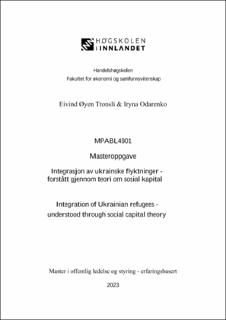| dc.contributor.advisor | | |
| dc.contributor.author | Eivind Øyen Tronsli | |
| dc.contributor.author | Iryna Odarenko | |
| dc.date.accessioned | 2023-07-05T16:10:42Z | |
| dc.date.available | 2023-07-05T16:10:42Z | |
| dc.date.issued | 2023 | |
| dc.identifier | no.inn:inspera:148100067:71836043 | |
| dc.identifier.uri | https://hdl.handle.net/11250/3076186 | |
| dc.description.abstract | Krigen i Ukraina som brøt ut i fjor vinter har ført til at mange ukrainere har måtte forlate sine
hjem og flykte til utlandet. Flere tusen av ukrainske flyktninger har kommet til Norge, og det
forventes tusentalls av ankomster i årene som kommer. Den nye flyktningstrømmen har skapt
enormt press på tjenestene som jobber rundt flyktninger i kommunene. For å lette på dette
presset og sikre rask integrering av de nyankomne flyktningene har myndighetene innført en
rekke lovendringer både som omhandler mottak og kvalifisering.
Formålet med studien er å avdekke kommunenes strategier for tilpasning til de endrede
betingelsene for mottak og integrering av ukrainske flyktninger under første fase av den
ukrainske flyktningkrisen. Kunnskapen om dette kan være nyttig for planlegging av tiltak
innenfor flyktningarbeid i andre norske kommuner, herunder både under den pågående
flyktningkrisen og eventuelt andre flyktningkriser eller flyktningstrømmer i fremtiden.
Studien tar utgangspunkt i flyktningarbeid i to case-kommuner, der søkelyset særlig rettes mot
muligheter og utfordringer for integrasjonsprosesser i en kommunal kontekst. Det teoretiske
grunnlaget for oppgaven er teorier om sosial kapital og dets operasjonalisering av Ager &
Strang (2008) som gir bedre forståelse for integrasjon som prosess. Studien er basert på
empiriske data innhentet gjennom semistrukturerte intervjuer med informanter fra de to
respektive case-kommunene. Dataanalysen er gjennomført ved hjelp av tematisk analyse av
de transkriberte intervjumaterialene.
Funnene viser at til tross for gode hensikter har ikke alle elementene i det endrede lovverket
fungert i henhold til hensikten med tanke på raskere integrering eller redusert press på
kommunene. Kommunenes egne tilpasningsstrategier til de endrede betingelsene for mottak
og integrering av den nye flyktninggruppen har vært svært forskjellige som også førte til helt
ulike utfall både med tanke på tjenestekvalitet, bredden av tilbudet og graden av individuelle
tilpasninger. Dette viste seg å ha implikasjoner når det gjelder forutsetninger for dannelse av
sosial kapital og dermed integrering av denne gruppen. Den ukrainske flyktninggruppen har
vist seg til å være generelt mer ressurssterk enn de andre flyktninggruppene, særlig med tanke
med humankapital. Samtidig har denne flyktninggruppen flere utfordringer på noen andre
områder som utgjør hinder for integrasjon og krever dermed nye tilnærminger. | |
| dc.description.abstract | The war in Ukraine that broke out last winter has led many Ukrainians to have to leave their
homes and flee abroad. Thousands of Ukrainian refugees have come to Norway, and
thousands of arrivals are expected in the years to come. The new refugee stream has created
tremendous pressure on the services working around refugees in the municipalities. In order
to reduce this pressure and ensure rapid integration of the newly arrived refugees, the
authorities have introduced a number of legislative amendments both that dealt with reception
and qualification.
The purpose of the study is to uncover the municipalities' strategies for adaptation to the
changed conditions of the reception and integration of Ukrainian refugees during the first
phase of the Ukrainian refugee crisis. Knowledge of this can be useful for planning measures
in refugee work in other Norwegian municipalities, including both during the ongoing refugee
crisis and possibly other refugee crises or refugee flows in the future. The study is based on
refugee work in two case municipalities, where the spotlight is particularly focused on
opportunities and challenges for integration processes in a municipal context. The theoretical
basis for the thesis is theories of social capital and its operationalization of Ager & Strang
(2008) that provide a better understanding of integration as a process. The study is based on
empirical data obtained through semi-structured interviews with informents from the two
respective case municipalities. The data analysis is carried out using thematic analysis of the
transcribed interview materials.
The findings show that despite good intentions, not all the elements of the changed legislation
have worked according to the purpose regarding faster integration or efforts to reduce the
pressure on the municipalities. The municipalities’ own adaptation strategies to the changed
conditions for reception and integration of the new refugee group have been very different
which also led to completely different outcomes both in terms of service quality, the breadth
of the offer and the degree of individual adjustments. This was found to have implications
when it comes to conditions for the formation of social capital and thus integration of this
group. The Ukrainian refugee group has proven to be generally more resourceful than the
other refugee groups, especially with regard to human capital. At the same time experience
this refugee group several challenges in some other areas that constitute an obstacle to
integration and thus require new approaches. | |
| dc.language | nob | |
| dc.publisher | Inland Norway University | |
| dc.title | Integrasjon av ukrainske flyktninger - forstått gjennom teori om sosial kapital | |
| dc.type | Master thesis | |
